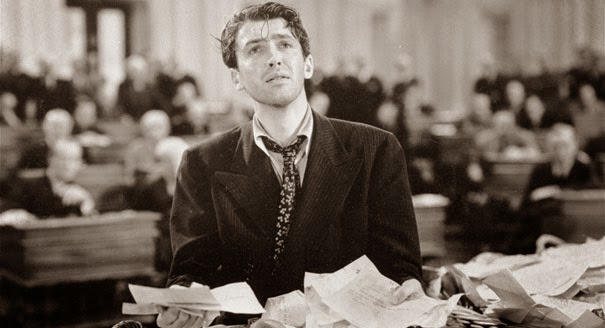I've never been much of a political person. I mean, I try to keep informed about what's happening (Obama's the...President, right?), but it all boils done to the simple fact that there's a lot of problems that need to be solved and no one really seems to have plausible solutions. Even when it seems there's hope for change, it never seems to turn out the way people envision it. There's too many hands guiding decisions and bigger forces behind it all. It seems foolish to think that one person can really make a difference–despite what we've been taught by feel-good movies. That may be a cynical or defeatist way at looking at things, but it's also the main reason why I've never really felt compelled to watch politically set films. Perhaps that's why I've waited so long to watch that Frank Capra classic about one moral man trying to make a change in government, Mr. Smith Goes to Washington.
The film opens with the governor of an unnamed state in the Western part of the United States (so as to remain an Everytown, USA. Like Springfield on The Simpsons) trying to find a replacement for a recently deceased senator. There's a lot of back and forth between whom should be selected. The film's villain, and the man clearly running the show (the sinisterly named,
Once our titular character arrives in our nation's capitol he does what anyone would do on their first day of work– skip it and go see the sites! But, it's really because he's so inspired by the capital dome and just needs to see the Lincoln memorial. Right. Now. And there we're treated to a sappy, soft-lit scene in which a small child reads the Gettysburg address aloud, while Smith looks on in awe. The scene is a little heavy-handed, but Capra has never been a director to shy away from sentimentality. You just have to go with it.
Luckily, the film is saved by drowning in saccharine by the appearance of Smith's secretary. A no-nonesense woman that goes by her last name, Saunders, and has what Ed Asner hated so much about Mary Tyler Moore, spunk. She's been there, done that and seen it all before. Needless to say, she's fabulous. And played by the kewpie-doll-after-a-bender voiced actress, Jean Arthur. I've never seen Jean Arthur in anything before, but after watching this film, I want to explore her entire filmography and binge on Jean Arthur films the way people do House of Cards. She's so perfect with her comic timing, line delivery, and chemistry with her co-stars (not just Stewart, whom she manages to bring some sex appeal to, but also her reporter friend, Diz, played by Scarlett O'Hara's father).
That's when we get to the scene that if anyone knows anything about this film (or if you had to study US government in high school), this is what you'll know...Filibuster! Plus, that's really just a fun word to say. This is where Jimmy Stewart gets to shine in all his Jimmy Stewart-ness and stand up to the man! Saying things like, "I wouldn't give two cents for all your fancy rules if, behind them, they didn't have a little bit of plain, ordinary, everyday kindness and little looking out for the other fella, too." Well, how do you argue with that.
At the time of its release the censors were concerned that the movie-going public would be scandalized how the film implies that the government is corruptible. Now us modern viewers take that view for granted, seeing the corruptibility not as an exception, but the norm. Seeing one man fighting for what's right and winning against the higher powers seems to be the stuff of fiction. But as long as cinema is filled with people like Jimmy Stewart's Jefferson Smith, there's hope that truth and justice will not just be fiction. I said before that it seems hopeless that one man could make a difference, but after spending over two hours with Mr. Smith it really does seem like anything is possible. After all, he made me almost care about politics.



AMAZING review of a great film! I'm so glad that you saw and liked this one. Stewart is remarkable here, but for my money Jean Arthur is the star. I would have given her the Oscar over Leigh (and to think, she wasn't even nominated!). Glad you chose this for your Blind Spot. can't wait to see where you go next month.
ReplyDeletethanks! jean arthur is amazing and my love for her is in the early stages, but my love of vivien leigh is eternal. and her win for GWTW is one of my favorite of all-time. but, definitely feel jean should've been nominated. she could replace greer garson...
DeleteI've long believed in two things.
ReplyDelete1: Jimmy Stewart has a face that should be printed on money
2. Every politician should be forced to watch this film once a year as a refresher course on what they're doing and what they're supposed to be doing. In life there is the brochure, and the harsh reality. Politics as it stands is the reality - this film is the brochure, and it's time for the two to start resembling each-other a little more.
the brits have the queen on their money, why not old hollywood royalty on the US currency. after all, stewart has done more for us than alexander hamilton ever has...
Deletei feel like today's politician's woldn't get the point and probably side with taylor and paine. "who's this young, idealist kid? and why is he so full of...hope?"